
Topics
As President Bush says he’ll rebuild New Orleans, we speak with Hip Hop activist and independent journalist Rosa Clemente about the crackdown in the shelters. She describes being harassed by a New Orleans police officer while doing interviews at a Red Cross shelter. [includes rush transcript]
Yesterday evening President Bush addressed the nation from the devastated city of New Orleans. He spoke in Jackson Square, in the heart of the French Quarter and said that the rebuilding of the Gulf Coast after Hurricane Katrina will be one of the largest reconstruction projects the world has ever seen. He also acknowledged that the government failed to respond adequately to the disaster. African Americans have been particularly angered by the government response to the disaster, with an overwhelming majority telling pollsters they believe help would have come quicker if so many of the people stranded had not been poor and black. Bush seemed to be responding to those charges by mentioning the role of persistent poverty in the region.
- President Bush, primetime address from New Orleans, September 15, 2005.
President Bush faced the nation at a vulnerable point in his presidency. Most Americans disapprove of his handling of Katrina, and his job-approval rating is at the lowest point of his presidency. In his speech, Bush promised to review the government response and cooperate in a Congressional investigation into what went wrong. He also said that a disaster on the scale of Katrina requires greater federal authority and a broader role for the armed forces.
- President Bush, primetime address from New Orleans, September 15, 2005.
We speak with activist Rosa Clemente who recently returned from New Orleans.
- Rosa Clemente, a Malcolm X Fellow for the Institute of the Black World and an organizer with the Malcolm X Grassroots Movement. She just returned from New Orleans.
- For more go to: RosaClemente.com
Transcript
AMY GOODMAN: Yesterday evening President Bush addressed the nation from the devastated city of New Orleans. He spoke in Jackson Square, in the heart of the French Quarter and said that the rebuilding of the Gulf Coast after Hurricane Katrina will be one of the largest reconstruction projects the world has ever seen. He also acknowledged that the government failed to respond adequately to the disaster. African Americans have been particularly angered by the government response to the disaster, with an overwhelming majority telling pollsters they believe help would have come quicker if so many of the people stranded had not been poor and black. Bush seemed to be responding to those charges by mentioning the role of persistent poverty in the region.
GEORGE W. BUSH: When communities are rebuilt, they must be even better and stronger than before the storm. Within the Gulf region are some of the most beautiful and historic places in America. As all of us saw on television, there’s also some deep, persistent poverty in this region, as well. That poverty has roots in a history of racial discrimination, which cut off generations from the opportunity of America. We have a duty to confront this poverty with bold action. So let us restore all that we have cherished from yesterday, and let us rise above the legacy of inequality. When the streets are rebuilt, there should be many new businesses, including minority-owned businesses, along those streets. When the houses are rebuilt, more families should own, not rent, those houses. When the regional economy revives, local people should be prepared for the jobs being created. Americans want the Gulf Coast not just to survive, but to thrive; not just to cope, but to overcome. We want evacuees to come home, for the best of reasons — because they have a real chance at a better life in a place they love.
AMY GOODMAN: President Bush speaking in New Orleans. He faced the nation at a vulnerable point in his presidency. Most Americans disapprove of his handling of the hurricane, and his job approval rating is at the lowest point of his presidency. In his speech, Bush promised to review the government response and cooperate in a congressional investigation into what went wrong. He also said a disaster on the scale of Katrina requires greater federal authority and a broader role for the armed forces.
GEORGE W. BUSH: I also want to know all the facts about the government response to Hurricane Katrina. The storm involved a massive flood, a major supply and security operation, and an evacuation order affecting more than a million people. It was not a normal hurricane — and the normal disaster relief system was not equal to it. Many of the men and women of the Coast Guard, the Federal Emergency Management Agency, the United States military, the National Guard, Homeland Security, and state and local governments performed skillfully under the worst conditions. Yet the system, at every level of government, was not well-coordinated, and was overwhelmed in the first few days. It is now clear that a challenge on this scale requires greater federal authority and a broader role for the armed forces — the institution of our government most capable of massive logistical operations on a moment’s notice. Four years after the frightening experience of September the 11th, Americans have every right to expect a more effective response in a time of emergency. When the federal government fails to meet such an obligation, I as President, am responsible for the problem, and for the solution.
AMY GOODMAN: President Bush speaking on Thursday from New Orleans. We’re now joined by Rosa Clemente. She’s a Malcolm X fellow for the Institute of the Black World and an organizer with the Malcolm X Grass Roots Movement. She just drove in from New Orleans. Welcome to Democracy Now!.
ROSA CLEMENTE: Thanks for having me, Amy.
AMY GOODMAN: Well, you had quite an experience for the brief time you were there. Talk about why you were there and what happened?
ROSA CLEMENTE: I felt I needed to go, particularly as a younger person of color. I think this is a watershed moment for particularly black and people of African descent in America, and I wanted to be there. I didn’t want it to be filtered through anyone’s eyes but my own and my partner who went down with me, Brad Young. And it’s just — It was my duty to be there, to be able to report back particularly to the hip hop generation, and I was also very upset at the low, low numbers of people of color, journalists, that I saw on the ground. The only ones I really saw were folks from CNN and mainstream media, and as I’m a proud member of alternative and progressive media here in New York, it was my duty to be there.
AMY GOODMAN: So, what happened when you went, particularly to look at the shelters? You went where, to the —
ROSA CLEMENTE: Well, first we went to New Orleans, and actually, we went to the Convention Center and, you know, just saw real estate speculators there and Blackwater mercenaries protecting property and didn’t realize that the Marriott and the Wyndham hotel were across the Convention Center and began to ask the question: Why weren’t those hotels taken over as eminent domain? That’s the question I have. If someone can take my private property for —- to build a highway or a medical facility, why were these hotels not opened to let these people not languish in what can only be described as a living hell. And to see the militarization. We then went to Algiers and spent the day with Malik Rahim. We could not leave because of the curfew, and that was a first experience for me. It was an experience to have an M-16 pointed at my car and from -—
AMY GOODMAN: What do you mean?
ROSA CLEMENTE: When we got on I-10 West, we went to a military checkpoint, and when we pulled up, three of the National Guards just had M-16’s pointed at the front of the car, and the side door and the side door, the two front doors. Then we went to the next military checkpoint, and they told us we could not go in at all. We snuck in and we got on Canal Street and we worked our way through that whole area. We then went to Algiers again to spend the day with Malik Rahim and also see the levee, and see what’s going on with that and to see the amazing work that Malik Rahim and Indymedia folks are doing by setting up a command center. It was amazing to be there to see that being built.
AMY GOODMAN: And I encourage people to go to our website, Democracynow.org. We also went with Malik, a community organizer in the Algiers neighborhood, right to the health center which was around the corner. It’s closed, the Arthur Monday Health Center. But in the driveway has been a dead body for two weeks. And as he was telling us that he has told every level of authority, concerned about disease, the disrespect to the bodies, been there since the day of the hurricane, every level of that authority drove by, and we went up to them and asked them, “There’s a dead body here, will you be picking it up?” Louisiana State Police, the New Orleans Police, the National Guard, the Army, the First Cav, the Department of Homeland Security, an ambulance drove by, and yet this has been going on for two weeks.
ROSA CLEMENTE: Yeah. I mean, I think the one thing that struck me was the smell, when I realized that it’s the smell of death in the air of New Orleans, and that was just shocking because I have only kind of seen that on TV, right, and when people make that face, but — and we saw things that looked like body parts, but of course, I just couldn’t look — but it didn’t look — it looked like human body parts that had been mutilated in the garbage cans behind the Convention Center. As of Monday, when we looked in the Convention Center, you could see the remnants of everything, and just — it’s just horrific just to see that. So, Malik had told us about that that dead body that I think was finally picked up.
AMY GOODMAN: Oh, really? Well that would have been in the last few days. Talk about the shelter where people who have been evacuated are staying, where you tried to document?
ROSA CLEMENTE: Yeah. We then went to the Baton Rouge River Center, which is the largest shelter in Louisiana, seven miles away from Governor Blanco’s mansion. She has not visited there. We were asking residents, “How many times has the Governor come here to visit?” They said, “Not one time.” There’s about four thousand people in that shelter. It’s supposed to be, “one of the best-run American Red Cross shelters.” It can only be described as a prison. Everyone we talked to in there said it was a prison-like facility. Well, you have to go through metal detectors to get in. There’s a curfew. When we did get in there and had registered earlier with the Red Cross as media, we were then stopped — the National Guard let us in, and us being someone that was traveling with us, a lawyer, and the videographer, Brad Young.
When we got in there, the National Guard let us in, but then the Baton Rouge Police Department said something to the National Guard and the National Guard said, “You can’t come in. You’re not media.” “What do you mean, I’m not media. Here’s my press pass.” “Well, you’re not the media I know.” And I said, “Who I do talk to?” And they said, “An American Red Cross volunteer.” They sent someone over and the American Red Cross volunteer said, “You’re over time. Interviews can only happen up until 6:00 p.m.” I said, “I called the Red Cross and in fact, I see CNN in here with a camera. So, what’s going on?” So, we were audio — you know, I was — I had my mini disc on and Brad had his camera on and then the — it was the Baton Rouge Police officer who said, “Turn your equipment off.” We said, “We’re not turning our equipment off until we’re told by someone from the American Red Cross. You don’t run this shelter. You are here to enforce the law.” He said, “I’m here to do whatever I want. Turn it off.” We refused to. He then grabbed Brad, threw him over the table, and pulled out the handcuffs and went to arrest him.
Something ensued in that point. I was not watching. I was more mini-discing the kind of chaos because then the people coming in started to kind of stop and say, “What’s going on? Why can’t they videotape?” People were noticing, “Well, they’re the only black people here. Why are you not stopping those other people on the corner, right here, the CNN crew?” And Brad got escorted out along with the lawyer that was with me. I was left there. The officers said, “I want your tape.” “Why do you want my tape?” He said, “Because you said my name into the tape.” I said, “Your name is public information.” He said, “You’re slandering me, give me your tape.” He went to grab my mini disc and I backed up, and he said, “You’re under arrest.” I said, “Am I being detained?” He said, “No, you’re under arrest.” He then begins to call for his backup, backup, and I said, “Well what are you going to do?” He goes, “Come over here.” I said, “You are going to have to grab me and you are going to have to physically — you are going to have to put handcuffs on me.” He said, “Give me your mini disc; I’m not going to ask you again.” So, I popped the tape out. I put it in my pants and I handed him the mini disc. I said “Here’s the mini disc. You didn’t ask for the tape. If you want the tape, you have to strip search me in public.” He called for backup again. I said, “Am I under arrest?” “You’re under arrest.” “Can I leave?” “You’re under arrest.” The Lieutenant came with three other people, I guess more superior to him, and they whispered, had a little conversation. The Lieutenant goes, who are you with? I said “I’m here with Pacifica — I’m a reporter with Pacifica radio. I’m also corresponding for many — the Bev Smith Show”, and I gave him the rundown. He said, “Let me see your press credentials.” I showed it to him. He said, “On behalf of the Baton Rouge Police Department, Miss Clemente, we apologize. You’re free to go.”
We then went outside and stayed until curfew, which is 10 p.m. and got amazing interviews with some young men who actually said “I’d rather be in prison because at least in prison, I have information.” When we asked them what that meant, what it meant is that they’re not — they don’t get papers. For four thousand people, there’s only three TVs. For four thousand people there’s only three computers. They can only go on the computer not to access websites but to download FEMA forms. Then they download these FEMA forms, but many people are illiterate. There’s no one there to help them. There were no Spanish language translators although there’s a sizable Latino population in there. There’s a Filipino and Vietnamese population, and no translators for them. So they have other people kind of looking out for them. You know, they are giving kids — the Church of Scientology is the biggest organization in there. There was about forty of them. What they do is every hour they go and give kids lollipops and little juices, and potato chips. We asked the young men “What kind of food are you getting?” They get a bagel and orange juice in the morning. They get a peanut butter and jelly sandwich during the day, and they get ravioli with some type of white sauce, a scoop of corn and a piece of bread. Some of the young men are not allowed to wear sneakers because if they’re already labeled as a, quote, “gang member”, they’re not allowing them to wear sneakers. They have to wear what we call “prison slippers”. I mean, just — Amy, it just goes on and on and on.
AMY GOODMAN: Well, if people want to see your reports, you can go to Rosa’s website at rosaclemente.com. Rosa, thanks for being with us.
ROSA CLEMENTE: Amy, thank you so much for having me.

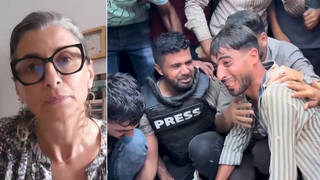
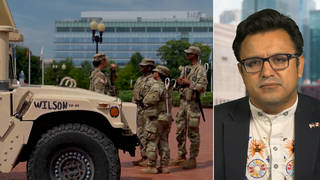
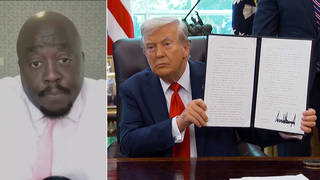
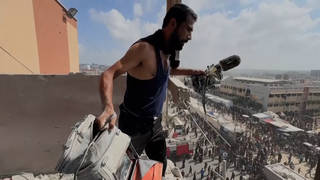





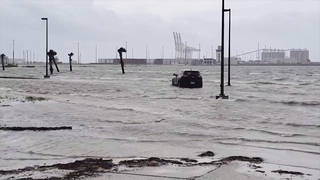
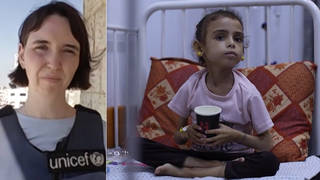
Media Options